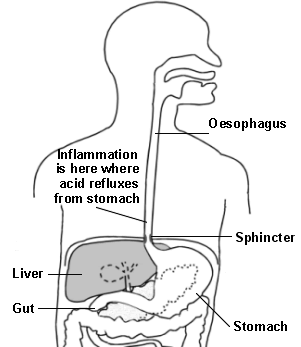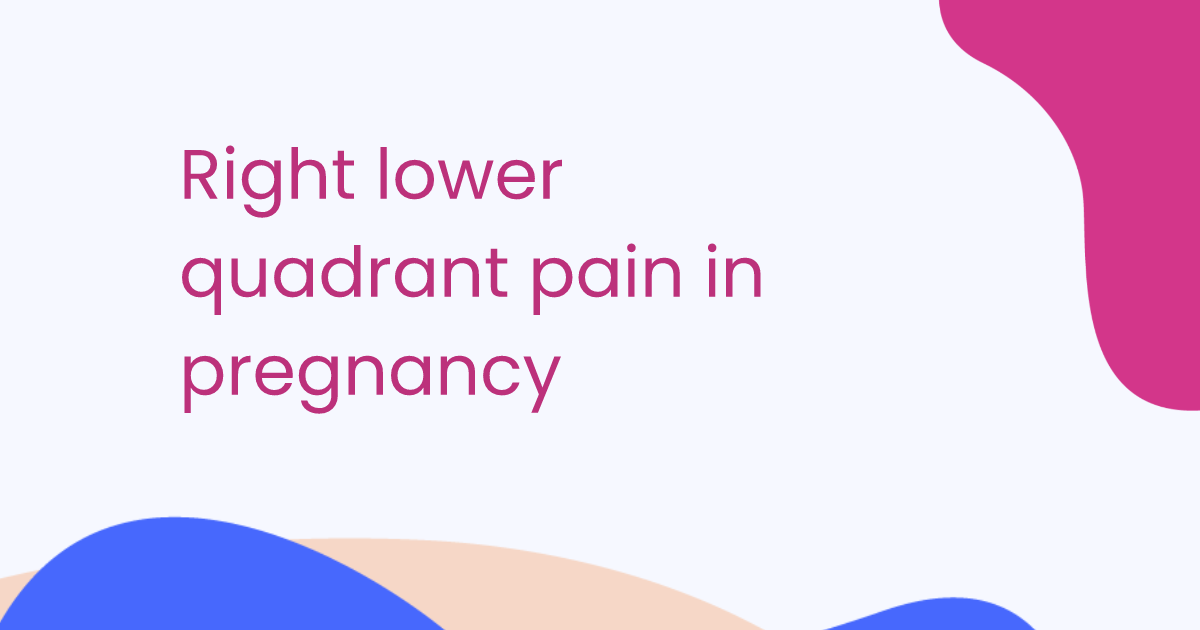Indigestion and acid reflux in pregnancy
Dyspepsia
Peer reviewed by Dr Rachel Hudson, MRCGPLast updated by Dr Caroline Wiggins, MRCGP Last updated 14 Mar 2024
Meets Patient’s editorial guidelines
- DownloadDownload
- Share
- Language
- Discussion
Indigestion (dyspepsia) occurs at some point in around half of all pregnant women. It is usually due to acid reflux from the stomach into the gullet (oesophagus).
In this article:
Continue reading below
What is indigestion and acid reflux?
Indigestion (dyspepsia) is a term which includes a group of symptoms (detailed below) that come from a problem in your upper gut. The gut (gastrointestinal tract) is the tube that starts at the mouth and ends at the anus. The upper gut includes the gullet (oesophagus), stomach and the first part of the small intestine (duodenum). Various conditions cause dyspepsia.
Indigestion is really common in pregnancy - it occurs at some point in around half of all pregnant women. Indigestion in pregnancy is usually due to reflux of acid from the stomach into the oesophagus.
Understanding the oesophagus and stomach
Acid reflux inflammation

When we eat, food passes down the gullet (oesophagus) into the stomach. Cells in the lining of the stomach make acid and other chemicals which help to digest food.
Stomach cells also make mucus which protects them from damage caused by the acid. The cells lining the oesophagus are different and have little protection from acid.
There is a circular band of muscle (a sphincter) at the junction between the oesophagus and stomach. This relaxes to allow food down but normally tightens up and stops food and acid leaking back up (refluxing) into the oesophagus.
What causes acid reflux in pregnancy?
Back to contentsAcid reflux in pregnancy occurs in the same way as for people who are not pregnant, and gives the same symptoms. Being pregnant increases the chance of getting acid reflux because of:
Pregnancy hormones. The increased level of certain hormones when pregnant has a relaxing effect on the sphincter muscle. That is, the tightness (tone) of the sphincter is reduced during pregnancy.
The growing baby. The size of the baby in the tummy (abdomen) causes an increased pressure on the stomach.
Slower emptying of the stomach. When pregnant, food and drinks stay in your stomach for longer before moving along the gut into your intestines. Having food and drinks in your stomach for longer can make you more likely to have indigestion.
One or all of the above increase the chance that acid will reflux into the oesophagus. The indigestion usually settles on its own after the birth of your baby when your hormones change back to their non-pregnant state and the baby is no longer increasing pressure on your stomach.
You are more likely to develop indigestion in pregnancy if you have previously had gastro-oesophageal reflux before you were pregnant.
Continue reading below
Acid reflux symptoms during pregnancy
Back to contentsAcid reflux symptoms are the same as for people who are not pregnant. Symptoms can vary from mild (in most cases) to severe. They can include one or more of the following:
Heartburn. This is a burning sensation which rises from the upper tummy (abdomen) or lower chest up towards the neck. (It is a confusing term as it has nothing to do with the heart!)
Waterbrash. This is a sudden flow of sour-tasting saliva in your mouth.
Upper tummy (abdominal) pain or discomfort.
Pain in the centre of the chest behind the breastbone (sternum).
Feeling sick (nausea) and being sick (vomiting).
Belching (burping).
Bloating.
Quickly feeling full after eating.
Symptoms tend to come and go, rather than being present all the time. They may begin at any time during pregnancy but happen more often, or are more severe, in the last three months of pregnancy.
Note: various other problems, associated with pregnancy and unrelated to pregnancy, are sometimes confused with indigestion. The following are symptoms which are not typical of indigestion. If you have any of these, it is important to see a healthcare professional urgently.
Vomiting.
Severe tummy (abdominal) pain.
Vomiting blood.
Losing weight.
Difficulty swallowing.
Black, sticky, tar-like poo (faeces) that smells very bad. Note that iron supplements can turn your poo black.
A cough which does not go away within 3 weeks.
If you experience any of the above, discuss them with a healthcare professional. If your symptoms become severe, or are repeated (recurring), or not improving with treatment, you should see your doctor.
Do I need any investigations?
Indigestion in pregnancy is usually diagnosed from your symptoms by your healthcare professional such as your midwife or doctor. Investigations are generally not needed.
How to ease indigestion
Back to contentsThe following are commonly advised. There has been little research to prove how well these lifestyle changes may help your symptoms. However, they are certainly worth a try and may avoid the need for medication.
Avoid certain foods and drinks
Some foods and drinks may make reflux worse in some people. (It is thought that some foods may relax the sphincter and allow more acid to reflux.) It is difficult to be certain to what extent specific foods contribute to the problem.
Let common sense be your guide. If it seems that a food is causing symptoms, try avoiding it for a while to see if symptoms improve. Many of the culprits are high in acid, fat, caffeine or spices. Foods and drinks that have been suspected of making symptoms worse in some people include:
Tomatoes.
Spicy foods.
Fatty foods
Fruit juices.
Hot drinks.
Coffee.
Alcoholic drinks. (Current advice is that you avoid all alcohol in pregnancy anyway.)
Eat smaller meals
Also, avoid large meals if they bring on symptoms. Some women find that eating smaller meals more frequently is helpful.
Stop smoking
The chemicals from cigarettes relax the sphincter muscle and make acid reflux more likely. Symptoms may ease if you stop smoking. In any case, it is strongly advised that pregnant women should not smoke for other reasons as well. See the separate leaflet called Pregnancy and smoking.
Have good posture
Try to sit upright with good posture to reduce the pressure on your tummy.
Bedtime
If symptoms happen most nights, it may help to go to bed with an empty, dry stomach. To do this, don't eat in the last three hours before bedtime and don't drink in the last two hours before bedtime.
Try raising the head of the bed by 10-15 cm (with sturdy books or bricks under the bed's legs). This helps gravity to keep acid from refluxing into the gullet (oesophagus).
Consider any medicines that you are taking
Some medicines may make symptoms worse. Women are rarely prescribed these medicines during pregnancy. However, it's worth checking with your pharmacist or your doctor if you think medication you are taking could be making your symptoms worse.
Continue reading below
How to treat indigestion
Back to contentsFor many women (especially if they have mild symptoms), making some lifestyle changes as above is enough to ease indigestion. However, if lifestyle changes do not help, medication may be needed to improve your symptoms.
Before taking any medication whilst pregnant you should speak with a pharmacist or doctor to check which medications are the safest choices when pregnant.
Antacids and alginates
Antacids are alkaline liquids or tablets that neutralise the acid. A dose usually gives rapid relief. You can use antacids when you need them for mild or infrequent bouts of indigestion.
Alginates are often combined with antacids. Alginates, such as Peptac or Gaviscon, help to protect the gullet (oesophagus) from stomach acid. They form a protective raft when they come into contact with stomach acid, blocking the acid from entering the oesophagus. Some alginates are specifically licensed for use in pregnancy.
There are many types of antacids and alginates available to buy, and some are available on prescription. Liquid types often work faster and are more effective than tablets. A doctor or pharmacist can advise which are suitable for you. Some points about these medicines are:
They can interfere with the absorption of other medication you are taking. The medications it can interfere with are normally printed on the medicine information leaflet that comes with the medicine.
Indigestion medicines suitable for pregnant people are lower in salt than the other medicines available.
Some medicines are specifically licensed for pregnant people.
Acid-suppressing medicines
Omeprazole is an acid-suppressing medicine that is licensed for use in pregnancy to treat indigestion that is still troublesome despite any lifestyle changes and antacids. Omeprazole needs to be taken regularly to be effective. Other acid-suppressing medicines are available but omeprazole is usually chosen as there is evidence it is the safest choice in pregnancy.
It is important to speak to a pharmacist or doctor before taking any medication whilst pregnant, to check it is safe for you to take in pregnancy.
Patient picks for Pregnancy complications

Pregnancy
Right lower quadrant pain in pregnancy
Your right lower quadrant (RLQ) is the bottom right side of your tummy (abdomen) from the tummy button down. There are many causes of right lower quadrant pain in pregnancy. Most are of no concern, but it is important to seek medical help if your pain is severe, doesn't settle, or is associated with other symptoms.
by Dr Toni Hazell, MRCGP

Pregnancy
Pre-eclampsia
Pre-eclampsia involves high blood pressure and protein in the urine. It can have no symptoms but some women may have headache, blurred vision, tummy pain and swollen ankles. The severity of pre-eclampsia is usually (but not always) related to your blood pressure level. It can be a serious condition but specialist care will help mother and baby stay safe.
by Dr Toni Hazell, MRCGP
Further reading and references
- Antenatal care; NICE guidance (August 2021)
- Dyspepsia - pregnancy-associated; NICE CKS, June 2024 (UK access only)
- Nausea/vomiting in pregnancy; NICE CKS, April 2025 (UK access only)
- Antenatal care - uncomplicated pregnancy; NICE CKS, January 2025 (UK access only)
Continue reading below
Article history
The information on this page is written and peer reviewed by qualified clinicians.
Next review due: 13 Mar 2027
14 Mar 2024 | Latest version

Ask, share, connect.
Browse discussions, ask questions, and share experiences across hundreds of health topics.

Feeling unwell?
Assess your symptoms online for free
Sign up to the Patient newsletter
Your weekly dose of clear, trustworthy health advice - written to help you feel informed, confident and in control.
By subscribing you accept our Privacy Policy. You can unsubscribe at any time. We never sell your data.